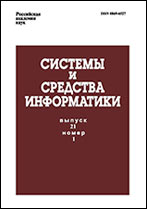|
Energy efficiency estimation of the computational cluster using a queueing system with threshold control and time-dependent service and arrival rates
R. V. Razumchikab, A. I. Zeifmanacd, A. V. Korotyshevaac, Ya. A. Satinca
a Institute of Informatics Problems, Federal Research Center "Computer Science and Control" of the Russian Academy of Sciences, 44-2 Vavilov Str., Moscow 119333, Russian Federation
b Peoples' Friendship University, 6 Miklukho-Maklaya Str., Moscow 117198, Russian Federation
c Vologda State University, 15 Lenin Str., Vologda 160000, Russian Federation
d ISEDT RAS, 56-A Gorky Str., Vologda 16001, Russian Federation
Abstract:
Consideration is given to the problem of energy efficiency of the computational cluster (servers), in which energy consumption threshold control policy (by adjusting operating frequency of processors) can be implemented. There are the papers in which Markov queueing systems with (queue-size) thresholds are used to solve such problems. Such approach allows one to compute main stationary performance characteristics of the computational cluster and obtain optimal energy-saving strategies (within the class of threshold strategies). It is usually assumed that service and arrival rates of the underlying processes are stationary. The present authors obtain a generalization of the known results for the case when service and arrival rates are the nonrandom functions of time (in particular, periodic). The authors consider $M(t)/M(t)/1/\infty$ queue with single-threshold service rate control policy. It is shown how, using general results for inhomogeneous birth-and-death processes, one can obtain relatively simple approximate algorithms for computation of the main (stationary) performance characteristics of the system. The numerical section illustrates the application of the obtained results to estimation of power consumption efficiency of the computational server.
Keywords:
queueing system; special functions; two-dimensional Markov chain; joint distribution.
Received: 16.09.2015
Citation:
R. V. Razumchik, A. I. Zeifman, A. V. Korotysheva, Ya. A. Satin, “Energy efficiency estimation of the computational cluster using a queueing system with threshold control and time-dependent service and arrival rates”, Sistemy i Sredstva Inform., 25:4 (2015), 19–30
Linking options:
https://www.mathnet.ru/eng/ssi431 https://www.mathnet.ru/eng/ssi/v25/i4/p19
|

|




 Contact us:
Contact us: Terms of Use
Terms of Use
 Registration to the website
Registration to the website Logotypes
Logotypes








 Citation in format
Citation in format 